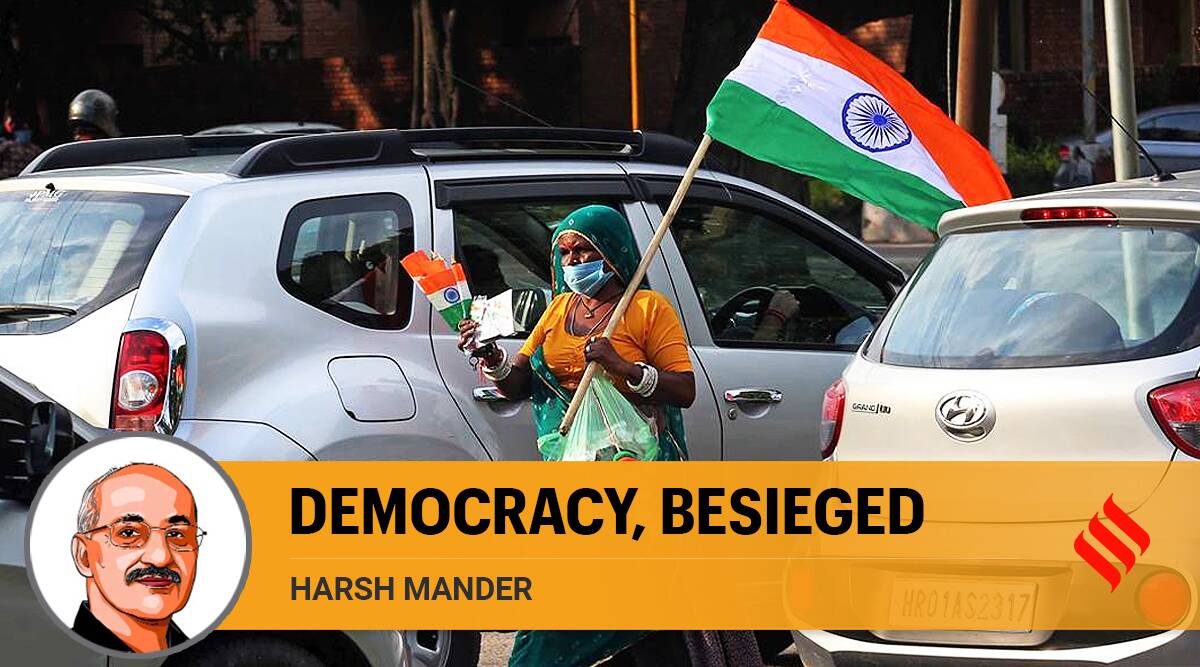Harsh Mander (15 December 2021) – A big tent was erected by US President Joe Biden when he invited leaders from over a hundred countries for a virtual global summit on democracy. With democracy floundering in many parts of the world, the timing of the summit was apt. In his welcome address, Biden called on leaders to reverse what he described as the “recession” of democracy.
But the credentials of many countries in the guest list as authentic democracies are contestable. Equally questionable is the record of the host country as an unflawed democracy. We might argue that the summit reflected more the strategic priorities of the US than being a space for candid introspection on what ails democracies. Universal adult franchise, free elections and the peaceful transition of power in obedience to electoral verdicts are doubtless necessary conditions for democracy. But if a people are to transition beyond the form of democracy to its authentic practice, the mettle of democracy must be tested against more severe standards. These include the exertions and success of the government in protecting equal rights of every minority; its upholding of the freedom to report on, and to peacefully dissent and resist actions and decisions of the state; and in ensuring a genuinely consultative and transparent process of decision-making.
Prime Minister Narendra Modi lauded in the summit what he described as the democratic spirit ingrained in every Indian, including a commitment to pluralism, social harmony and the rule of law. But ironically, it is each of these that is crumbling in India today. The truth is that like in many countries at the democracy summit, democracy in India is flailing. Take each of the three yardsticks of democratic practice I have listed above.
Decision-making is worryingly centralised around the office of the Prime Minister. Resolutions that affect the survival of millions, such as demonetising overnight 86 per cent of the country’s currency, or imposing a national lockdown with four hours’ notice with some of the smallest relief transfers to the working poor, are announced theatrically, with no evidence of consultation with experts, the states and even the cabinet. And peaceful mass protests are demonised as Maoist, jihadi or Khalistani conspiracies. These include the massive peaceful uprising for 100 days against changes in India’s citizenship laws that barred undocumented persons, specifically of Muslim identity, from the presumption of being a persecuted minority from a neighbouring country, and against three farm laws rammed through Parliament without debate and bipartisan examination.
India has become a dangerous place for people who dissent with or resist the policies and actions of the ruling establishment. It is routine for extraordinary anti-terror laws or colonial-era sedition laws to be slammed on people who struggle against the targeting of minorities, protest in places like Kashmir, fight the displacement from forests and lands of indigenous people, or uphold civic rights. Student activists, academics and rights lawyers, even poets and priests, have been jailed indefinitely and denied bail but given no opportunity to establish their innocence, because trials have not begun. Among these, an ageing Jesuit priest with Parkinson’s, who had devoted his inspiring life to fearlessly and peacefully fight the displacement of indigenous people, was jailed and he died in prison. Sudha Bhardwaj, a lawyer of exemplary dedication who lived and worked with the most impoverished mine workers, was forced to spend three years in prison. Recently, a Kashmiri activist, Khurram Parvez, was jailed, charged with abetting militants — he is widely loved for the help he extended to thousands of families whose loved ones “disappeared” during the decades of militant uprising in Kashmir. Even reporters are not spared: Siddique Kappan has been in jail for more than a year — he was arrested when he was on his way to report on the gang-rape of a Dalit woman — and charged with links to jihadi organisations. He has still not been even given a copy of the chargesheet against him.
Mahatma Gandhi spoke weeks before his assassination of his dream of an India in which a Muslim child can walk without fear. Fear has become a way of life for many Muslims in India today. He also declared that he obeyed only one dictator — his conscience. In India today, this dictator is persecuted and crushed. Democracy stands more jeopardised than ever in the journey of 75 years of the Indian republic.
This article first appeared in The Indian Express


